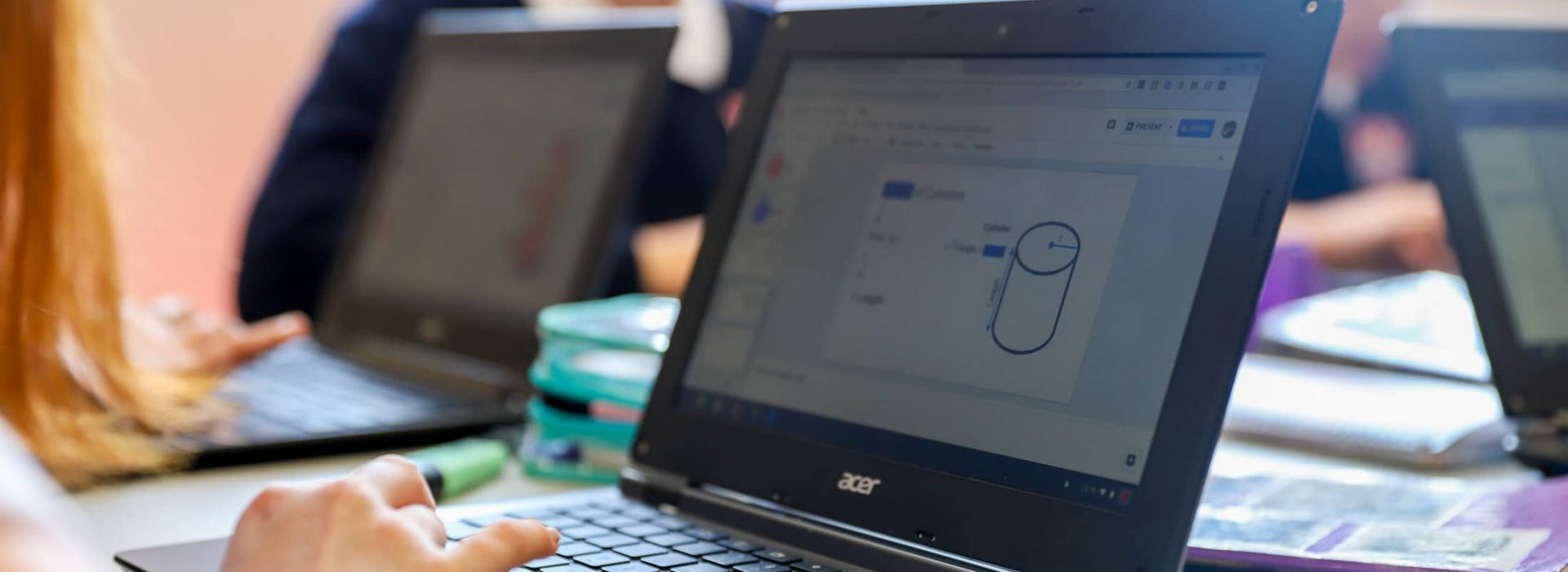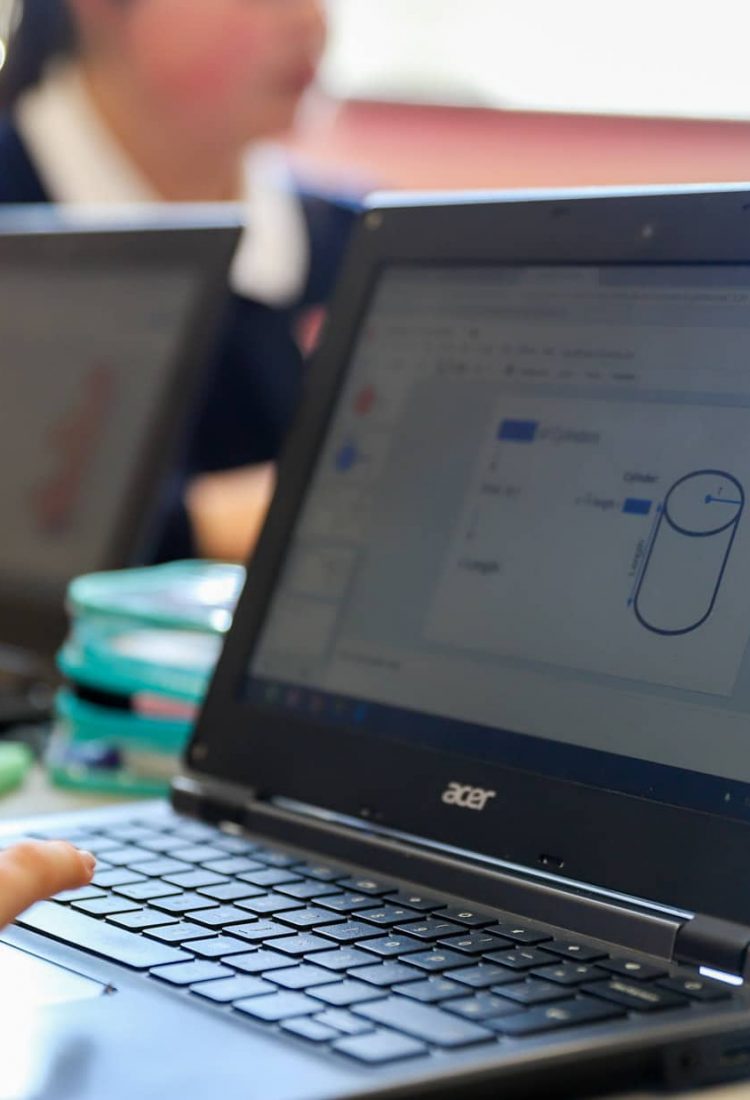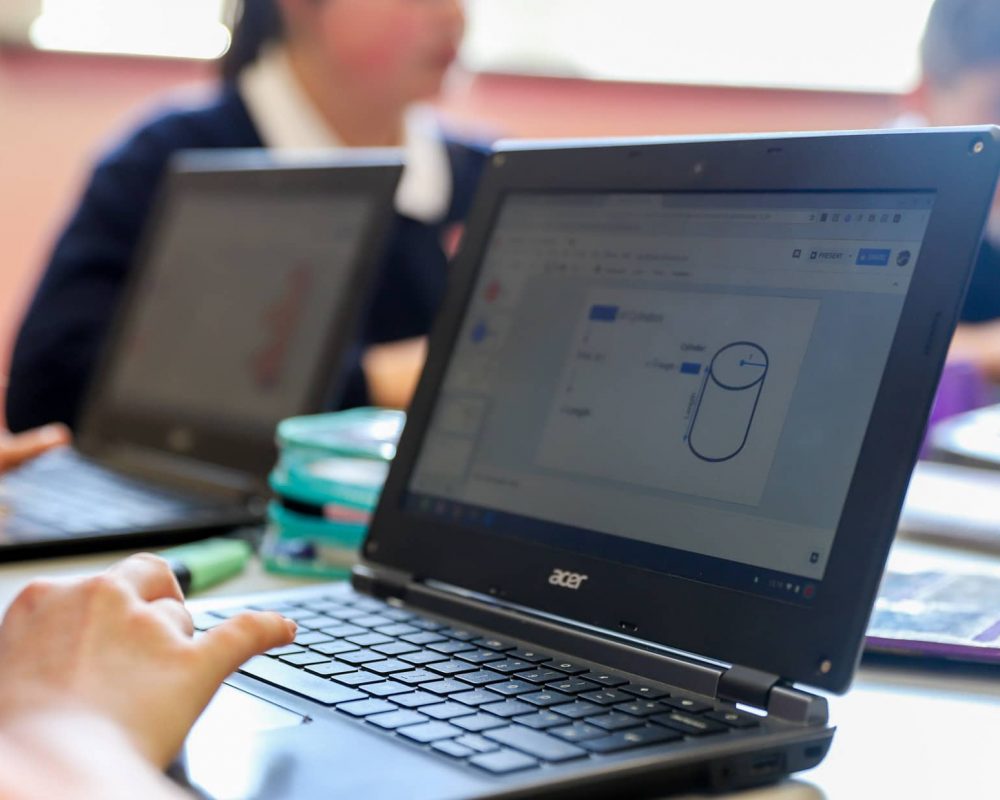One-to-one learning
We want to prepare students for the real world, and to use the best teaching methods available. So we give every student a Google Chromebook when they go into Year 9, or arrive at Churston in Year 12. They keep this for the rest of their time at school, taking it home and back each day.
We first trialled this one-to-one technology in 2014, and have been delighted with the advantages it gives. For example:
- Attainment levels among students using Chromebooks have risen significantly
- Teachers have found loads of useful new teaching methods
- Detentions have reduced
When we asked our students if chrome books had helped them in lessons, 89% of them said yes. When it came to homework, 86% said yes.
What is a Chromebook?
It’s a laptop computer, produced by Google, which works entirely online. So all documents, presentations, spreadsheets and so on are created, used and viewed in the Cloud. This means they can be shared instantly with anyone else, and several people can work on the same document simultaneously if needed.
Of course it also means that everyone has constant internet access in school (we have filters to block unsuitable content), so it makes it very easy for students to go online to research topics, view videos or take part in interactive quizzes.
How do Chromebooks help?
Here are a few examples of the things we can do with Chromebooks that we couldn’t do before:
- It’s much easier for teachers to share information with their students, from course material to homework.
- Students can take notes much faster and more easily, and therefore take more detailed and thorough notes.
- When it comes to homework, this can be researched easily, shared with the teacher, and handed in electronically. Students can work on collaborative homeworks with each other even after school. Teachers can mark homework online, which means they can give instant feedback if necessary.
- It’s much easier for students to work as a group. Shared documents mean you can work collaboratively, and make peer marking and reviewing much simpler.
- There are lots of interactive quizzes online that the students really enjoy using to test their knowledge. These vary from fun general knowledge tests for tutor sessions, to problem-solving puzzles, to vocab and grammar tests for language students. Teachers can set their own tests for students after explaining a concept, and get instant feedback on which students have grasped it and which need to go over it again.
Are Chromebooks useful outside lessons?
Once you have a way of communicating with students easily, and they all have online access, it opens up all sorts of possibilities. Tutors can use them to pass on announcements. Students can complete their Duke of Edinburgh award sections easily, as well as sharing documents for route planning and so on. Students who have difficulty taking in verbal instructions, such as homework details, can be sent them in writing. We can survey students easily, and with a higher response rate, when we want their input or feedback. In fact, we keep discovering new and useful ways to get more out of the Chromebooks.
Do students get enough handwriting practice?
One of the reasons we don’t give Chromebooks to students until Year 9 is because it gives them plenty of handwriting practice until the end of Year 8. By this point handwriting skills are generally fixed (scary, but true). Of course students still need to practise for exams, which is why all exam preparation, including practice papers, is done using pen and paper. However, according to English teacher Sarah Howgate, “The positive impact of really detailed, organised notes on all the exam texts that the students are studying outweighs any potential lack of handwriting.”
Do younger students get to use Chromebooks?
Yes they do. All our students know how to use Chromebooks, as it takes only a few minutes to learn. We have sets of Chromebooks on trolleys which teachers can book for their Year 7 or 8 classes when they need to.
What’s to stop students surfing the internet during lessons?
We use a classroom monitoring system, called GoGuardian, which means that teachers can see what each student has open on their screen. This is a pretty effective deterrent to getting distracted during lessons.
How do Chromebooks alter teaching style?
Here are a few of the things our teachers have said about how they use Chromebooks:
-
- “We have been sharing spreadsheets with the class so that they can track their progress and see what they need to do to improve. Marking online has also enabled us to give more detailed, individual feedback to students.” Design & Technology Teacher
- “Marking work online enables me to write more informative and detailed comments for the students because it is so quick to type.” Drama Teacher
- “One of the best things about Chromebooks is that I know I can always use IT.” History Teacher
- “Group work has become more focused, detailed and productive. Using shared documents with my Year 12 class I have noticed a significant improvement in the quality of analysis in their notes. Working collaboratively with their peers has enabled students to inspire and learn from one another.” English Teacher


